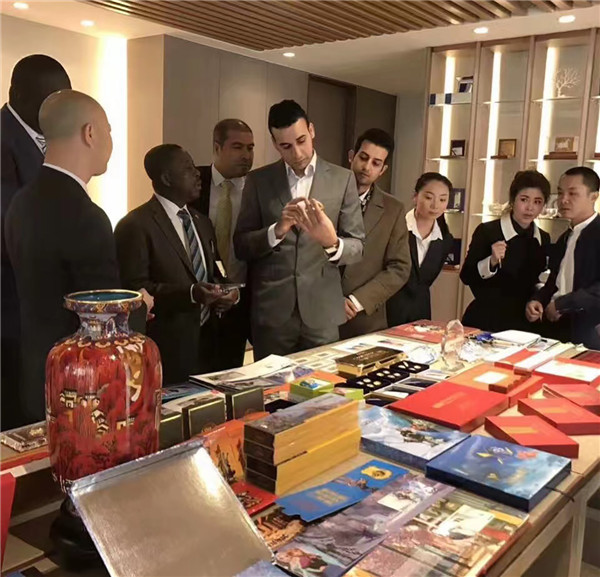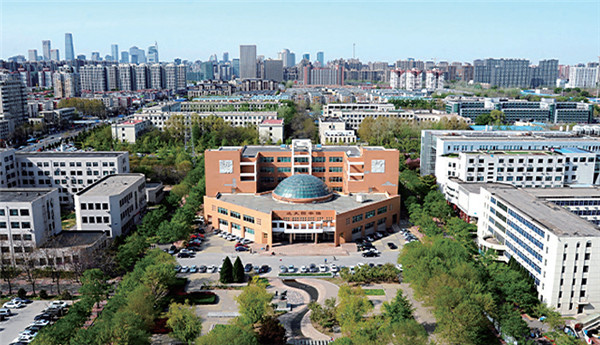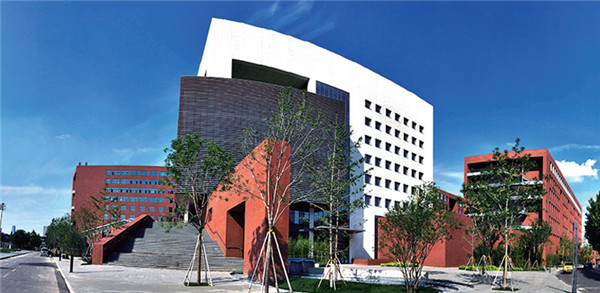探索中国语言
[巴勒斯坦] 哈伯 北京工业大学

来到中国留学之前我对中国文化有一定的了解。中国历史文化包括很多,例如:婚姻、家族、国家政权、贸易、衣食、文字、文学、经学、宗教、道德、民俗、节庆等,构成一幅清晰简要的中国古代社会生活的缩影。在中国读书对我而言是经历,也是历练。毕竟,在截然不同的文化背景下,迅速适应环境对每个在外国的学生来说都是一次巨大的挑战。
中华文化源远流长,文化的载体汉语极富魅力,我自打接触汉语就被她深深地迷住了。平时上汉语课一般都是老师站在讲台上,学生坐在下面听课,但课并不一定要这么上。生活处处有汉语,在自己探索学习的过程中,也能上汉语课。
在人类科技快速发展中,我们的语言知识的总量也在迅速发展。在电视上,我经常能看到许多有意思的广告语,那一条又一条的广告语,就是我们人类智慧的结晶,有的广告商为了自己的产品销量更高,绞尽脑汁地想让广告语更有吸引力。比如,蚊香广告——默默无“蚊”,淋浴头广告——随心所“浴”,电动车广告——“骑”乐无穷……这些广告语是通过把成语中的字换成那个字的谐音字形成的,有的人认为这是一种错误的做法,这玷污了中国的文化,还会误导孩子。但有的人认为这样做没关系,还能做反面教材。其实无论是哪一种,都没有关系,因为这都体现了汉语的魅力。
每一个城市都有它的方言,那些方言,体现了那个地域的文化色彩,北京的方言十分有趣,例如:昨儿个——昨天,明儿个——明天,嘛呢——干什么呢……在我学习语言中对于方言也是非常热衷,这也代表了地域的文化,老北京的传统。我看过这样的广告词:外语诚可贵,方言价更高;学了普通话,两者皆可抛。让我不得不佩服中国人对文化的思想创意,每个地域的方言体现了每个地域的文化色彩,而这些美妙的色彩为汉语这张图画添加了精彩的一笔。

哈勃在北京参加国际文化交流活动
汉语学习达到一定程度,我开始涉猎诗歌,诗歌是人类情感表达的高级形式,从诗中我体会到了中国古人的高尚品德和情操。宋朝著名诗人苏轼饱读诗书,更被宋神宗赞为“才与李白同,识比李白厚”。一场乌台诗案把他从朝廷贬到荒凉的黄州。他忍受的不只是恶劣的环境、同僚的排挤,还有心灵的拷问。是什么让他支撑下来?我想应该是他在书海中历练出来的胸怀。苏轼能于逆境中留下许多旷达乐观的诗文“莫听穿林打叶声,何妨吟啸且徐行”,“大江东去,浪淘尽,千古风流人物”,无不与他的广博学识和乐观豁达的心境有关。家喻户晓的诸葛孔明居于一隅,却知天下,料事如神。他博览群书,在书海中明白了古今更迭的规律,推演出现实的变迁。于是《出师表》千古扬名,三分天下功勋卓著。
同样,作为留学生,只有大量课外阅读,方知中国文化的博大精深。课外大量阅读,能炼出博大的人格胸怀。课堂所学当然有限,课外阅读能弥补课堂不足,让我在博览群书中,开阔视野,增加积累,陶冶情操,提高能力。在我看来,课外阅读才是语言盛宴的主菜。语言素养的高低差异,与课外阅读质量的高低有密切的关系。精选好书,潜心研读,才能让我体会书中的精华。

北京工业大学提供
有人说“读万卷书,行万里路”。诗仙李白遍走祖国大好河山,“蜀道难,难于上青天!”“天门中断楚江开,碧水东流至此回”,孕育出了他的浪漫思想和向上胸襟,“飞流直下三千尺,疑是银河落九天”“天生我才必有用,千金散尽还复来”。李白游历祖国山河的社会实践,成就了他的浪漫诗篇。

北京工业大学提供
我希望自己也能如李白一般游遍中国的山山水水,感受风俗人情、地理风貌。中国辽阔的土地给我带来无限的想象和动力。实践带给我灵感,和人们的交流带给我思想的火花。我会在生活实践中去检验,去丰富,去完善,去提升。学习、积累,是为了运用和创造。
自强不息、与时俱进、坚韧自信,中国传统文化恢复往日神采,让现代中国人不仅会敲击键盘,也会挥毫泼墨;不仅有科学精神,也有人文理念。这是传统文化的创新求解,更是民族的未雨绸缪。这些都值得我们留学生学习,我的祖国也需要同样的精神。
我爱中国这片热土,因为语言让我们相识,因为历史让我对中国抱有热情,这是一个充满历史的国家,希望未来的我能了解到更多的中国历史文化。
Explore the Chinese Language
[Palestine] Ihab S.S. Adib, Beijing University of Technology
Before I came to study in China, I had a certain knowledge of Chinese culture. There are many aspects in Chinese history and culture, such as marriage, family, state power, trade, food and clothing, writing, literature, classics, religion, morality, folklore and festivals. All these elements constitute a clear and brief epitome of ancient Chinese social life. Studying in China is both an experience and a test for me. After all, it is a great challenge for every international student to adapt to the life in a completely different cultural background.
Chinese culture has enjoyed a long history. The Chinese language, the carrier of culture, is extremely attractive. I have been fascinated by Chinese language since I came into contact with it. Usually in Chinese classes, the teacher stands at the podium and the students sit down and listen to the lecture, but the class does not have to be like that. There are Chinese classes everywhere in daily life, and I can take Chinese lessons in the process of my own exploration and learning.
In the fast development of human technology, the total amount of our knowledge of language also develops rapidly. On TV, I can often see many interesting advertising slogans, which are the fruits of human wisdom. Some advertisers rack their brains to make the advertising slogans more attractive. For example, mosquito-repellent incense-silent “mosquito”, shower head-at one’s “bath will”, electric car - “ride” is endless ... These advertising slogans are formed by replacing the word in the idiom with a harmonic word, some people think this is a wrong practice, which tarnishes the Chinese culture and misleads children. But many others think the other way because it can be a counterpoint. In fact, it doesn’t matter, because it reflects the charm of the Chinese language.
Besides, every city has its local dialects. Those dialects reflect the cultural color of that region. Beijing dialects are very interesting. For example,zuorge - yesterday,mingrge - tomorrow,mane - what to do... I am also very keen on dialects in my language learning, which also represents the regional culture and the tradition of old Beijing. I have seen such advertisements: Foreign languages are valuable, and dialects are more expensive; After learning Putonghua, you can throw away both. I have to admire Chinese people’s ideas and creativity on culture. The dialects of each region reflect the cultural color of each region, and these wonderful colors have enriched the Chinese language.
When my command of Chinese language reached a certain level, I began to dabble in poetry, which is an advanced form of human emotion expression. From reading poetry, I learned the noble character and sentiment of the ancient Chinese. Su Shi, a famous poet in the Song Dynasty, read a lot in books and was praised by Emperor Shenzong as “as talented as poet Li Bai and more knowledgeable than Li Bai.” However, a poetry case in Wutai relegated him from the royal court to the desolate city, Huangzhou. He endured not only the harsh environment and the ostracism of his peers, but also the torture of his mind. What kept his survival? I think it was his mindset, which was honed in the sea of books. Su was able to leave many optimistic poems in the face of adversity: “Listen not to the rain beating against the trees. Why don’t you slowly walk and chant at ease?” and “The Great River eastward flows, with its waves are gone all those gallant heroes of bygone years.” All those poems relate his extensive knowledge and optimistic and open-minded state of brain. Zhuge Liang, a household name in China, lived in countryside, but knew the world and was able to anticipate things like a god. He also read a lot of books, through which he understood the laws of historical changes and deduced the changes in the future. As a result, hisNorthern Expedition Memorial became famous for thousands of years, and his achievement to divide the nation into three parts has always been praised.
As international students, only a large number of extracurricular reading can we know the breadth and depth of Chinese culture. Reading a lot after class can refine a broad personality. What I have learned in class is limited. Extracurricular reading can make up for the lack of classroom study, so that I can broaden my horizons, increase accumulation, cultivate my sentiment and improve my ability. In my opinion, extracurricular reading is the main course of the language learning. The difference of language literacy is closely related to the quality of extracurricular reading. If I choose a good book and study hard, I can understand the essence of the Chinese culture.
Some people say, “Read one hundred thousand books and travel one hundred thousand miles.” Li Bai, the great poet of the Tang Dynasty, traveled all over the great rivers and mountains of the motherland. His poems, such as “It is easier to climb heaven than take the Sichuan Road” and “The gate of heaven is interrupted by the River Chujiang/the eastward blue water flows back,” have bred his romantic thoughts and broad-mindedness. “The torrent dropping three thousand feet/Straight down to the valley floor/I think it must be the milky way/Spilling to the earth from heavens,” “if I was born to be useful/a thousand gold scatters and comes back again.” Li Bai’s travel practice through the mountains and rivers of his country made his romantic poems fascinating.
I hope I can travel all over China like what Li Bai did and feel the customs and geographical features. China’s vast land has brought me infinite imagination and power. Practice brings me inspiration and communication with people gives me sparks of thought. I will test, enrich and improve my life practice. Learning and accumulation of knowledge are for application and creation.
With constant self-improvement, keeping pace with the times, tenacity and self-confidence, Chinese traditional culture has restored its former glory, so that modern Chinese people can not only hit the keyboard, but can also draw beautiful pictures; There is not only scientific spirit, but also humanistic concept. It is not only an innovative solution of traditional culture, but also a national plan for a rainy day. All these concepts are worthy for international students to learn, and my motherland needs the same spirit.
I love China, because its language makes us know each other better, and its history ignites my enthusiasm for the nation. This is a country full of history. I hope I can learn more about Chinese history and culture in the future.



